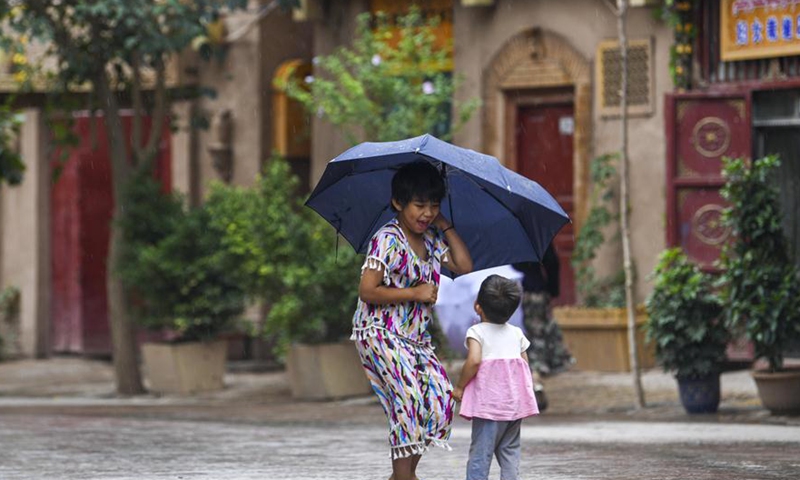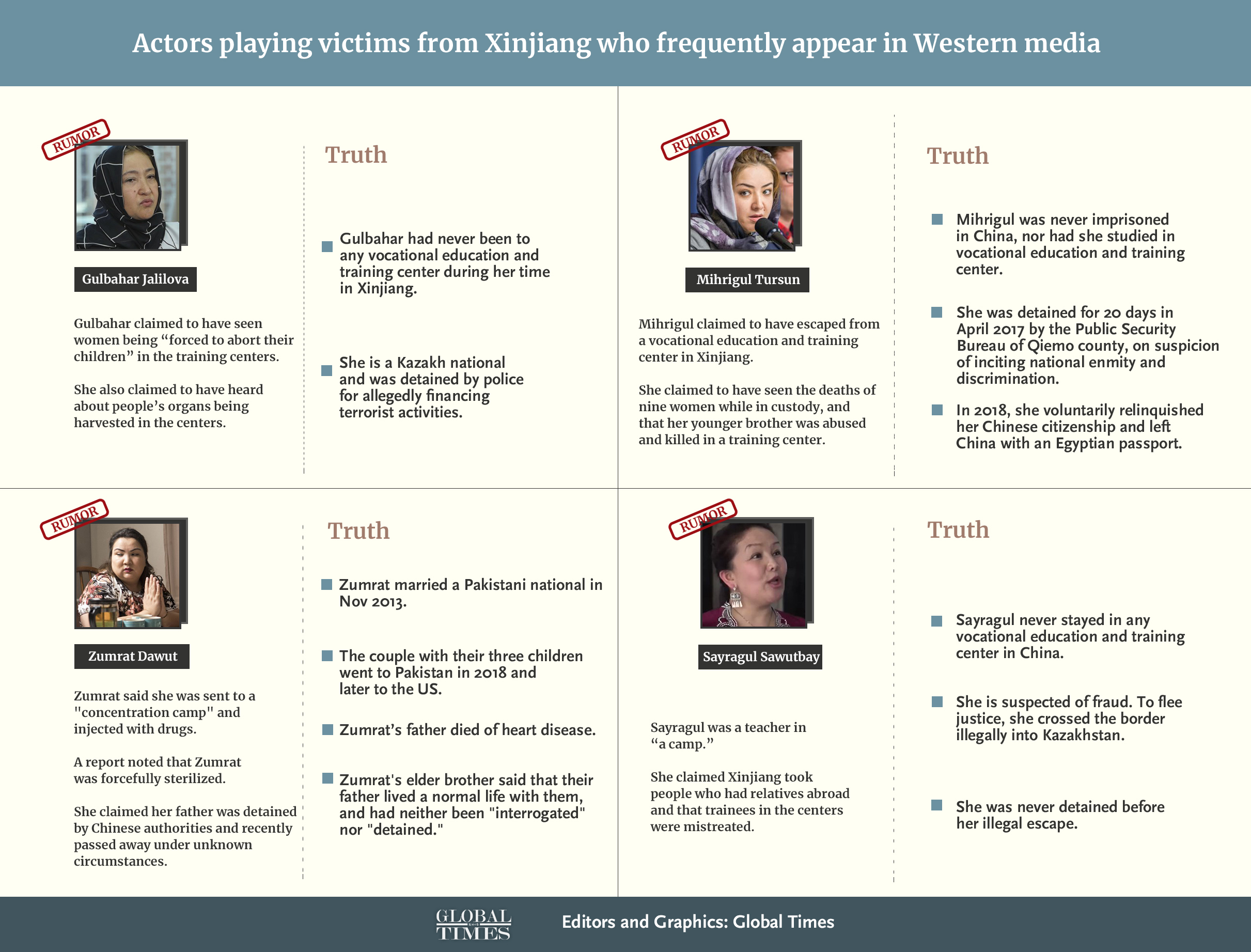GT investigation busts West's birth control lies in Xinjiang
Researcher, AP use flawed figures to smear China

Photo:VCG
Flawed statistics, wrong calculation method, misleading figures, untrustworthy interviewees… These are what the Global Times and scholars found in the Associated Press' recent investigation and German researcher Adrian Zenz's "research" on China's "birth control campaign" in its Xinjiang Uygur Autonomous Region. When many Western media are enthusiastic about giving rolling coverage of a new sensational accusation against China, few of them are willing to take a deeper look at the sources of the so-called new evidence of accusing China of human rights violations.
Experts said the recent hype of "birth control" in China's Xinjiang shows escalating smears and attacks on China against the backdrop of the 44th Session of the Human Rights Council and strained China-US ties.
Last month, Zenz, who was honored as a "leading expert on China's Xinjiang" by Western media but exposed to be a far-right fundamentalist Christian "led by God" against China, released his new "research" on Xinjiang over a more sensational topic - birth control, in which he accused the Chinese government of using sterilization, IUDs and mandatory birth control measures to suppress Uygur birth rates.
Ahead of Zenz released his research, AP released a report on the same topic based on data from Zenz's report and so-called "detainees" of Xinjiang's vocational education and training centers.
However, flaws are everywhere in Zenz's so-called research, including the way data was calculated, demonstrated and used for the unscientific, unprofessional and biased interpretation.
One graphic used in Zenz's report, which he claimed came from the annual Xinjiang Statistical Yearbooks and was calculated himself, showed a decline in the natural population growth rate in the ethnic counties of Hotan and Kashi from 2005 to 2018 - from around 15.5 per mille to around 2.5 per mille.
In the AP report, Zenz was quoted as saying, "This kind of drop is unprecedented" and "part of a wider control campaign to subjugate" the Uygurs.
However, they fail to mention data of the natural population growth rates of the Han-majority counties in the same period, which shows a drop from 6 per mille in 2016 to nearly zero in 2017. A small inflection appeared from 2017's nearly zero to 2.5 per mille in 2018.
Huang Wenzheng, a demographic expert, told the Global Times the decline in the natural birth rate cannot simply lead to a conclusion of a so-called "birth control campaign," as many reasons, including economic development, getting more people in higher education and decreasing fertility intention, may contribute to the result. Generally, many ethnic minorities in the world have seen their birth rates decline as their economies and education improves.
The change in the number of college students in Xinjiang in the past decades echoed Huang's remarks. The number of college students per 10,000 persons was 90.44 in 2005 and 150.78 in 2018. The number of students enrolled at institutions of higher learning increased from 188,752 in 2005 to 398,751 in 2018, according to Xinjiang's Yearbook 2019.
Huang also said that in view of Zenz's data, both Han and ethnic minorities have seen a decline in natural population growth rates since 2014, even though China lifted the so-called one-child policy in 2015. Compared to the national birth rate during the same period, Xinjiang experienced a sharp decline, which shows that the natural birth rate followed the economic development in the region.

Children play in the rain in the ancient city of Kashgar, northwest China's Xinjiang Uygur Autonomous Region, July 7, 2019. In the first half of 2019, the ancient city of Kashgar received over 310,000 tourists. Photo:Xinhua
An example of flawed data was also found in Zenz's report which showed new IUD placements per capita in Xinjiang from 2010 to 2018 much higher than the national rate. He claimed to use sources from the Annual Health and Hygiene Statistical Yearbooks of China, and new IUD placements are estimated as total placements minus removals.
The Global Times read the yearbooks of hygiene statistics, and found that the data on the removal of IUDs was not released every year, which raises the question as to how Zenz acquired the estimated number when no data was in his claimed source.
The new IUD placement per capita in Zenz's report also has problems. Zenz claimed in 2014 that 2.5 percent of newly placed IUDs in China were fitted in Xinjiang, and the number rose to 80 percent in 2018.
The Global Times found from the yearbooks on health and hygiene in 2014 and 2019 that in 2014, the number of IUDs used in Xinjiang was 2,805,038, accounting for 2.1 percent of the total number in China (129,974,784). In 2018, the number of placements of IUDs in Xinjiang was 328,475, accounting for 8.7 percent of the total number nationwide, 3,774,318. Various birth control measures are widely used in other places in China, while IUDs are preferred in Xinjiang, which explains the higher ratio.
The 80% cited in Zenz's report cannot be arrived at by any calculation, except by misplacing the decimal point.
As for the Uygur population in Xinjiang, it saw an increase in the past decades. Data from Xinjiang's Statistics Yearbook in 2019 showed that there were 5.55 million Uygurs in 1978, while in 2018 the Uygur population increased to 11.68 million.
"The 'research' is malicious as it distorts China's previous family planning policy, which is stricter on Han people," Huang said.

Infographic: Global Times
Aside from flawed data, interviewees who appeared in Zenz's "research" and the AP report are untrustworthy.
Zenz used Zumrat Dawut, a Uygur woman from Xinjiang who now lives overseas, as an example. Zumrat claims she was "forced" to have "surgical sterilization," and "IUDs were mandatory for all women who have had two children" in Xinjiang.
The Global Times reporter visited Abduhelil Dawut, one of Zumrat's elder brothers, in Urumqi in November 2019. The brother said that when Zumrat delivered the third child, "she was found to have fibroid and later had surgery." The brother said Zumrat continued "peddling lies online."
The AP report also claimed to have interviewed "seven former detainees" who told vivid stories of how they saw other "detainees" or themselves forced to have birth control pills or injected with fluids. It also claimed to obtain Xinjiang hospital slides, and implied the hormonal medication Depo-Provera was used as a family planning measure.
The Global Times consulted with several doctors specializing in gynecology and obstetrics, who said that Depo-Provera is sometimes used to treat irregular menstruation and polycystic ovarian syndrome. It was not usually used as birth control medicine since one shot works for up to 12 to 14 weeks.
So-called victim Gulbahar Jelilova also appeared in the AP report, who claimed to see women being "forced to abort their children" in the vocational training centers.
However, the Global Times learned from relevant departments and various sources that Gulbahar is a Kazakh national and was detained by police for allegedly financing terrorist activities. She had never been to any vocational and education training center during her stay in Xinjiang.
The Global Times also found that Gulbahar's name appeared in a story of VICE magazine's French language edition on June 19. And this time, the woman claimed she heard about organ harvesting of people in the training centers.
It seems that when some Western media or researcher come up with new ideas to accuse China's policies in Xinjiang, they talk to the same people, like Gulbahar, and will always get a satisfying answer for different topics, experts and observers said.
"Lies about Xinjiang are like scattered puzzles, and when you put them together, you will find how ridiculous and absurd the picture some anti-China forces are making. It's also like using a similar batch of samples to do different experiments, but always get the same results," Zhu Ying, deputy director of the National Human Rights Education and Training Base of Southwest University of Political Science and Law, told the Global Times.
There is nothing about science or professionalism in Zenz's "research" or AP's report. However, Western media and politicians still buy them, as these disguised political practices could help them hype Xinjiang topics and put dirty water and pressure on China, especially when the 44th session of the Human Rights Council is ongoing.



